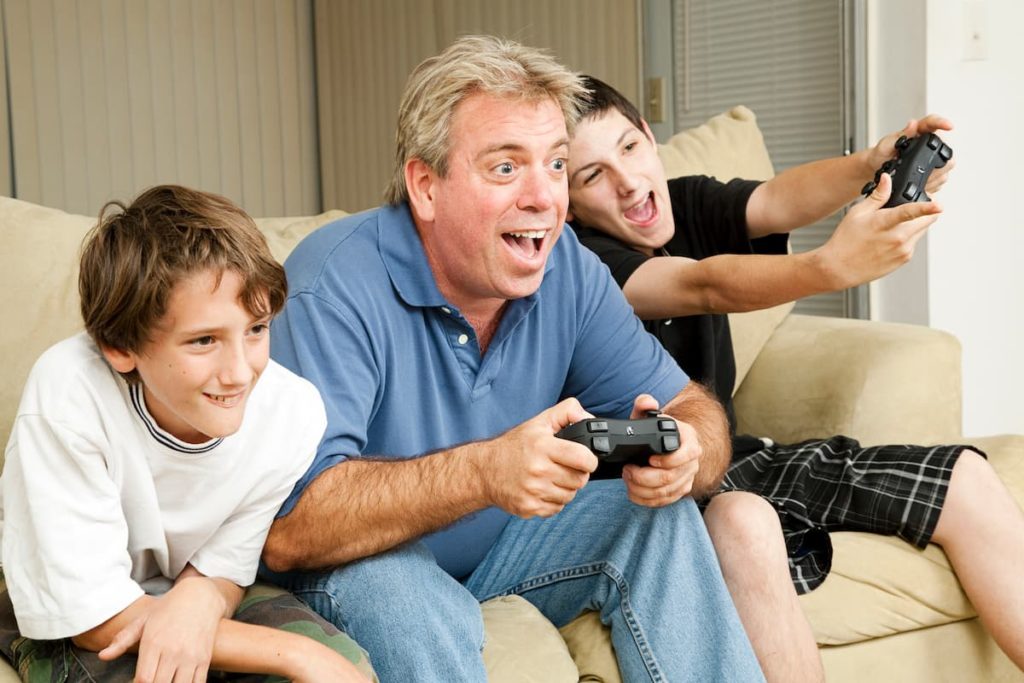In the parenting style context, permissive parenting is often associated with poor parenting. It is valuable to understand what actions amount to permissive parenting, its consequences, and how to improve your parenting style if you are a permissive parent.
Permissive parenting is when parents give their children significant freedom. These parents consider their children their equals and don’t fulfill a clear supervisory role. Permissive parenting includes rarely disciplining the child, being overly nurturing, and bribing the child to behave.
Permissive parenting can have long-term negative effects on children’s development. Let’s explore permissive parenting, the negative impact of this parenting style, and ways to improve from being a permissive parent.
Like many “unhealthy” parenting styles that are argued to cause more harm than good, permissive parenting likely comes from the parents’ own childhood and unmet needs during it. When we become parents, we are “rocketed” back to our childhood and subconscious memories emerge in many different forms and at different times.
It can be argued that permissive parents had a lot of negative experiences when they were children, and by adopting the permissive parenting style, they may be trying to “heal” their own childhood and likely, as children, experienced authoritarian parents or a similar parenting style.

The Permissive Parenting Style Explained
Permissive parenting styles are often referred to as indulgent parenting. However, permissive parenting is classified as parents who treat their children as if they are their equals. These parents try to avoid strictly disciplining their children and give them the freedom to make their own decisions.
Permissive parents are known for being loving, but their nurturing nature is often argued to be not enough to raise a well-rounded child. Permissive parents tend to focus on giving their children what they need to be happy at that moment without thinking about the long-term consequences of what they allow their children to do.
Permissive parents often avoid disciplining their children and would negotiate with them to find an even ground that makes the child happy or compromise to the child’s benefit to avoid a scene. These parents can often focus on having peace in the household without acknowledging that conflict between parent and child is inevitable.
These parents will go out of their way to avoid conflict with their children by taking the “easy road” and just giving them their way instead of having to discipline them or problem-solve, which may lead to tears on their child’s part.
These parents fail to realize that it is only natural for children to hear the words “no” and understand that life will not always work out the way they want it to. In this regard, permissive parents provide few rules and guidelines for their children and hardly enforce consequences for misbehavior.
Permissive parents lean more toward being their child’s friends than their parents. As peacekeepers, they want their children to see them as the “cool parent” who is not strict or the “fun killer.” This behavior is dangerous because children in their formative years require parents, not adult friends.
Given that it is their formative years, they need people to explain how the world works and what they can and cannot do. Their parents’ role is to equip them for the real world and shape their thinking so that they have the skills to survive in the real world. Permissive parenting can be argued to fail children in that it does not get prepare children for the “real world” but rather grow up with a false expectation that things will always work in their favor and there will be little to no consequences for wrong behavior.
Permissive parents have good intentions because they think their actions are helping their children become freethinking and independent. They fail to realize that their child needs adult guidance and will become independent as the years go by.
Permissive parents fail to give their children the structure they need to live a balanced life. These parents believe their children should explore life and learn by doing things. While it is vital for children to learn and try new things, permissive parenting takes things to the extreme by failing to consider the child’s age when allowing them to do certain things.

Permissive Parenting Examples
Permissive parenting can manifest in various behaviors that can all be harmful in their own way. Here are examples of instances where a parent’s behavior will be regarded as permissive parenting and the potential consequences of these actions.
Child Of a Permissive Parent Has No Bed Time
Permissive parents often allow their children to go to bed whenever they feel like it. This gives the child the freedom to do what they want, whenever, and for as long as they wish.
From the parent’s perspective, they may view it as giving the child the opportunity to get to know their body and listen to when their body is telling them that they are tired. However, not enforcing a bedtime is poor parenting because bedtimes are essential for ensuring children get enough sleep to promote their growth and have healthy bodies and minds.
The Child Of a Permissive Parent Has No Screen Time Limit
Permissive parenting can manifest in children not having a limit on screen time. Some permissive parents use kids’ shows to entertain their children, so they do not have to. In this regard, excessive screen time can also be used as a cop-out to avoid having to entertain and engage with their child.
Having no screen time limit is regarded as poor parenting because excessive screen time can result in attention problems, visual issues, and behavioral issues. Excessive screen time can also be harmful to the child’s sleep cycle because they may end up becoming very hyperactive at night and have trouble sleeping.
Child Of a Permissive Parent Can Watch Any Show
Apart from permissive parents not limiting their child’s screen time, permissive parents may also allow their child to watch any show they feel like. These parents often disregard age restrictions and let their children watch anything that entertains them.
During their formative years, children learn things very quickly and can easily learn poor behavior and inappropriate words while watching shows that are not meant for their age. Allowing children to watch whatever they want can corrupt their innocence and disturb their peace, depending on what they’re watching.
Child Of Permissive Parent Can Be On Social Media While Young
Social media is notorious for having a negative effect on children’s mental health. Permissive parents may allow their children to access social media from a young age. Many children are intrigued by videos on YouTube and TikTok and often ask their parents if they can watch videos on these social media platforms.
Platforms like YouTube and TikTok offer parental controls to ensure children are not exposed to harmful content. However, permissive parents are likely to leave their children to their own devices to watch whatever they want and are unlikely to use the parental control feature.
Permissive parents may even leave the child unattended to watch things online, which often results in the child finding inappropriate content and watching it without their parent’s knowledge.

Child Of Permissive Parents Can Eat Whatever They Want
Teaching a child how to eat from a young age intuitively has the potential to determine their relationship with food for the rest of their lives.
Permissive parents often allow their children to eat whatever they want, whenever they want, and however much they want. Allowing children to eat in such a manner can harm their health, as they may end up overeating and are likely to eat more unhealthily given the freedom to eat what they like.
This is particularly problematic because children do not possess adequate knowledge of what is unhealthy and healthy food. They also do not know how much food is too much and how little is too little. It is their parents’ role to exercise portion control to ensure their child eats enough food and does not overeat. It is also their parent’s role to ensure they eat nutrient-dense meals meeting the recommended dietary allowance.
Permissive parents often view their actions as giving their children the opportunity to figure out what they like and do not like. They also believe they are teaching their child to listen to their body by seeing how they feel when they do not eat enough versus how they feel ill when they overeat.
While children need to learn to listen to their bodies, this permissive parenting approach is unnecessary. Children can learn by being taught how much food is appropriate and told what will happen when they eat too much or too little.
Child Of a Permissive Parent Is Bribed To Behave
Permissive parents try to avoid disciplining their children at all costs. Given that they are trying their best to have a friendship with their child, they will try to keep the peace wherever possible.
Children are known for their ability to put up a fight and love a good negotiation. When it comes to permissive parenting, these parents often quickly give in to their child’s demands. If the child is misbehaving, the parents may try to bribe them to behave by offering them food or a toy as a reward.
In this regard, permissive parents take a short-term approach to discipline by resolving issues quickly through bribery or compromising to suit the child’s demands. While this approach keeps the peace, it fails to teach the child that things will not always work out in their favor, and sometimes they must make compromises.
Therefore, permissive parents who bribe their children to behave create an unrealistic expectation that the child will always get their way and that people will go out of their way to please them. This approach is particularly harmful as it fails to prepare the child for the real world, where things will not always go as planned.
Child Of Permissive Parent Included In Family Drama
Permissive parents often include their children in conversations that are not appropriate for their age.
There are certain things that children need to be protected from hearing. Permissive parents may find no harm in arguing in front of their children because they believe the child is too young to understand. They may also allow the child to hear issues that face the family, such as if the family is under financial strain.
Informing the child of the family’s problems places an emotional burden on the child whereby they become concerned about the future yet have no control over the circumstances. In this regard, permissive parents unintentionally burden their children, affecting their mental health.
Child Of a Permissive Parent Makes Major Decisions
Children who have permissive parents are often allowed to make major decisions. The harm in this is that they do not understand the veracity of the situation and therefore cannot make informed decisions.
Some permissive parents may allow their children to skip school when they do not feel like going because they are in the mood to stay home. These parents do not ensure that their child knows the importance of school attendance and fail to equip them with the discipline they will require when entering the real world.
Permissive parents may allow their children to make decisions such as quitting sports because they would rather stay home and play video games. These parents think they are allowing their children to do what makes them happy but fail to educate them on the importance of extramural activities for social development and physical health.
In situations where children want to make major decisions, their parents must inform them of the potential consequences of their actions. However, permissive parents often do not go to the trouble of informing their child of the veracity of the situation and allow them to make the decision, as they believe it is an opportunity for the child to practice decision-making and learn a lesson from their mistakes.

How Does Permissive Parenting Affect The Child?
Permissive parenting sets the tone for how the child perceives the world around them. Here are potential ways that permissive parenting can negatively affect children.
Children Of Permissive Parents Struggle Mentally
Children raised by permissive parents tend to struggle with mental health, often experiencing anxiety and depression.
While there are many causes of anxiety and depression, children of permissive parents are susceptible to mental health struggles because their parents failed to prepare them for the real world adequately.
The parent’s role is to equip them with the life skills to survive and thrive. However, permissive parents only create an environment for their children to thrive within the household because they are allowed to do what they want and are nurtured by their parents irrespective of their behavior.
However, when the child interacts with others, they realize that their behavior is not socially acceptable and often face rejection from others who refuse to tolerate it. Given that the child was not taught to deal with rejection, they struggle to handle situations where they are not embraced. This can result in them feeling anxious when interacting with others or depressed because of their hostile engagements with others.
Additionally, if the child was included in family drama or exposed to explicit content at a young age, they may struggle with mental issues due to the trauma they experienced watching and hearing negative things.
Children exposed to extremely negative things often replay these things in their heads, have nightmares about them and live in a constant state of fear. These emotions can lead to them becoming extremely anxious and may result in them being depressed.
Children Of Permissive Parents Lack Discipline
Children should be taught time management and routines from a young age. Permissive parents who do not set bedtimes for their children or allow them unlimited screen time fail to educate them on the importance of time management.
Additionally, parents who allow their children to eat whatever they want do not teach them the importance of rationing and not being gluttonous.
These behaviors often negatively affect the child later in life when they need to exercise discipline, as they cannot exercise self-control because their parents never instilled it in them.
Children Of Permissive Parents Can Be Unhealthy
Children of permissive parents can potentially experience health issues if their parents do not regulate what they eat and how much they eat. Furthermore, they can experience health issues if their parents do not set a bedtime, resulting in them not getting enough sleep.
In this regard, permissive parenting can have significant consequences for children’s health when they fail to educate their children about health care and do not fill the role of a guardian who should supervise the child’s activities.
Children Of Permissive Parents Misbehave
Permissive parents who bribe their children to behave often cause children not to have a clear understanding of socially acceptable behavior. These children do not understand that good behavior is necessary and instead view it as an option.
By giving their child a treat when they misbehave, the child sees it as a reward for bad behavior, despite the parent intending it to be a bribe to behave. Consequently, the child does not learn how to distinguish between right and wrong and has the potential to become arrogant and unwilling to obey authority figures.
Conclusion
Permissive parents are well-intentioned and believe that by giving their children what they want, they are making their children happy. Permissive parents often include their children in family drama, allow them to make major decisions by themselves, enjoy screen time for extensive periods watching whatever they like, and be active on social media without any parental supervisory restrictions.
These parents often do not set bedtimes for their children, allow them to eat whatever they want, and bribe them to behave in instances where they are misbehaving. Permissive parenting has the potential to harm a child’s development and can result in the child struggling to deal with rejection, experiencing health issues, suffering from depression, and displaying negative behaviors that are not socially acceptable.

